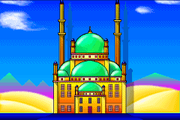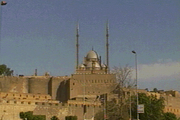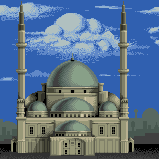Mosque of Mohammed Ali: Difference between revisions
mNo edit summary |
Derekblue1 (talk | contribs) m (Added image) |
||
| Line 1: | Line 1: | ||
{{multiple image | |||
|align=right | |||
|direction=vertical | |||
|width=180 | |||
|footer=Mosque of Mohammed Ali in DOS, ''CD-ROM Deluxe'' and SNES versions. | |||
|image1=Mosque of Mohammed Ali MIMDOS.png | |||
|alt1=DOS | |||
|image2=Mosque of Mohammed Ali MIMCD.png | |||
|alt2=CD-ROM Deluxe | |||
|image3=MosqueofMohammedAli MIM.png | |||
|alt3=SNES | |||
}} | |||
{{Quote|''The Mohammed Ali Mosque was built by a sultan in 1430''{{sic}}'' using the Turkish style of the Ottoman Empire. Its nickname, The Alabaster Mosque, comes from the valuable white stone that covers the temple's facade. The clock tower on the courtyard's western side was a gift to the sultan by King Louis Philip of France in return for the stone obelisk, which now stands in front of France's Place de la Concorde. Egyptian sultans lived in the mosque until 1517. It is now used only for prayer.''|'''Pamphlet'''|''[[Mario is Missing! (PC)]]''}} | {{Quote|''The Mohammed Ali Mosque was built by a sultan in 1430''{{sic}}'' using the Turkish style of the Ottoman Empire. Its nickname, The Alabaster Mosque, comes from the valuable white stone that covers the temple's facade. The clock tower on the courtyard's western side was a gift to the sultan by King Louis Philip of France in return for the stone obelisk, which now stands in front of France's Place de la Concorde. Egyptian sultans lived in the mosque until 1517. It is now used only for prayer.''|'''Pamphlet'''|''[[Mario is Missing! (PC)]]''}} | ||
Revision as of 09:31, September 13, 2024
- “The Mohammed Ali Mosque was built by a sultan in 1430[sic] using the Turkish style of the Ottoman Empire. Its nickname, The Alabaster Mosque, comes from the valuable white stone that covers the temple's facade. The clock tower on the courtyard's western side was a gift to the sultan by King Louis Philip of France in return for the stone obelisk, which now stands in front of France's Place de la Concorde. Egyptian sultans lived in the mosque until 1517. It is now used only for prayer.”
- —Pamphlet, Mario is Missing! (PC)
The Mosque of Mohammed Ali (Arabic: مسجد محمد علي, Masjid Muhamad Ealiin; Turkish: Mehmet Ali Paşa Camii) is a mosque in Cairo, Egypt. It makes a few appearances in Super Mario media.
History
Mario is Missing!
The mosque is visited by Luigi during the events of the PC, SNES, and NES versions of Mario is Missing! A Gingerbread Clock was stolen from the mosque, and the plumber has to return it. He is rewarded a prize of 1,400 dollars.
Contrary to the mosque's in-game pamphlet information, it was completed in 1848 instead of 1430.[1]
Luigi must prove the clock's authenticity by answering two of the following trivia questions:
- Who lived in the Mosque until 1517?:
- King Louis Phillips
- The Emperor of Ottoman
- Sultans
- Cassius Clay
- What will you find inside the main domed building?
- The Sultan's Crypt
- The Ottoman Empire
- Egyptian Sultans
- The Clock Tower
- What did the Egyptians trade for the clock tower?
- Recipe for french fries
- Obelisk
- Alabaster
- Harem
Super Mario 64 / Super Mario 64 DS
An edited photograph of the real-life mosque is used in Super Mario 64 and Super Mario 64 DS as part of the skybox of Wet-Dry World, alongside a row of buildings from Shibam Hadramawt, Yemen.[2]
References
- ^ Tarek Torky. "Mosque of Muhammad Ali Pasha". Discover Islamic Art. Retrieved July 28, 2024.
- ^ CharlyCNintendo (March 1, 2021). Every piece to Wet Dry World is now found! The building at the top is the Mosque of Muhammad Ali, located in Cairo, Egypt. In a medieval fortification from the Islamic era known as the "Citadel of Cairo" The buildings below ARE NOT from Casares, Spain. they are from Shibam, Yemen. Twitter. Retrieved March 1, 2021.


